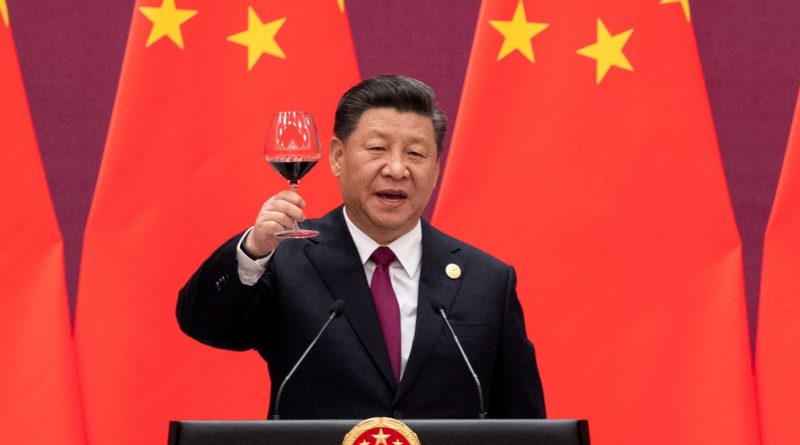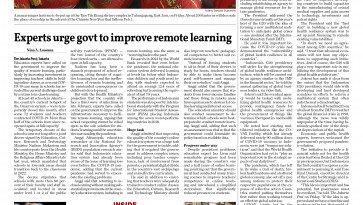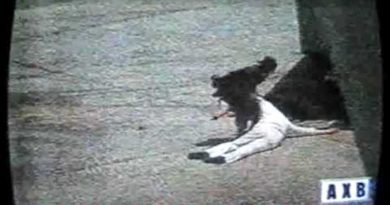BLOG | In My Mind–Bata Batuta | Harry Roque: China as peacemaker | LAWYERING for DU30-China?
Bata Batuta.

OPINION
China as peacemaker

.
.
In an election-related debate last year, I emphasized that the international order has become increasingly multipolar. We now exist in a global system where political, military and economic powers are no longer the dominion of single or two nation-states.
The world survived the bipolarity of the Cold War between the United States and the former Soviet Union, which essentially divided the international community into two opposing blocs from 1947 to 1991. By the late 2000s, it slowly transitioned from America’s post-Cold War unipolarity as emerging superpowers like China, Russia and India have challenged, if not reconfigured, the existing global power structure.
Not one to shy away from furthering its sphere of influence, China has come forward as a peacemaker in the ongoing Russia-Ukraine conflict. Before his official visit to the transcontinental nation, China’s President Xi Jinping communicated a 12-point peace agenda to President Vladimir Putin. The peace plan urges all concerned parties to uphold every nation’s sovereignty, independence and territorial integrity in consonance with the United Nations Charter and international law. It also calls for the outright rejection of double standards in the application of international law [Foreign Ministry of China]. On March 21, Russia and China released a joint statement that described their non-aligned, non-confrontational strategic partnership as the opposite of a Cold War-type alliance. They pointed out that there is no superior democracy in the world relative to a country’s right to pursue its development path [Xinhua News].
In reaction, Ukrainian President Volodymyr Zelensky expressed his readiness to meet and reconnect with President Xi in his country, according to the Associated Press. Meanwhile, the US Secretary of State warned the international community that China’s peace plan is a stalling tactic for Russia to freeze the war on its own terms [CNBC News].
While I am critical of its increasing belligerence in the West Philippine Sea, I welcome China’s diplomatic move vis-à-vis the Ukraine crisis. It is the first time a powerful country has attempted to broker peace talks between the warring nations. Given the US-European Union tag team against Russia or the United Nation’s uncompromising stand on the war, I would have expected a neutral European state to step up to the plate. A mediation promoted by China is overdue since the Eastern European conflict has dragged on for more than a year and brought the world’s economy to its knees.
In a recent resolution, the UN General Assembly said the war has adversely impacted food security, energy, environment and nuclear safety on a global scale. The International Monetary Fund (IMF) said the conflict continues to weigh on the world’s economic activity, with global inflation expected to hit 6.6 percent in 2023. The Philippine IMF representative has projected a five percent growth rate for the country due to a tighter policy stance and a confluence of global shocks, including spillovers from the war in Ukraine, according to an exclusive STAR business story in February. It is a significant drop from our record-high 7.6 percent Gross Development Product growth in 2022.
Agenda for peace
The Chinese position to settle the Ukrainian crisis includes the eschewal of the Cold War mentality, cessation of hostilities and resumption of peace talks. The Chinese Foreign Ministry said the Putin-Xi conversation centered on the political and diplomatic settlement of the conflict through equal-footed, rational and results-oriented dialogue.
The bipolar reign of America and the former Soviet Union was purported as a good-versus-evil battle by the media, think tanks and academic institutions (depending on their political affiliation). But the Cold War era has become an anachronism in our multipolar world. China has achieved economic hegemony and strengthened its political influence and military power. The BRICS (Brazil, Russia, India, China and South Africa) nations are strengthening their collective power base to have a bigger say and stakes in international development, security and politics. They want to play an equal role in addressing global issues independent of Western-led initiatives.
The peace plan is also pushing to resolve the humanitarian crisis, protect civilians and prisoners-of-war (POWs), safe keep nuclear power plants, facilitate grain exports and scrap unilateral sanctions not authorized by the UN.
The 1949 Geneva Conventions and their Additional Protocols protect civilians, medics, aid workers as well as combatants who are wounded, sick and POWs. Further, both countries should provide safe passage to humanitarian organizations that provide food and medicine to civilians in war-torn areas.
In terms of securing nuclear plants, any military operation cannot target installations that can cause widespread damage to civilians under the rules of war. As a top exporter of wheat and barley, Ukraine supplies grains to low- and middle-income countries in Africa. The UN-backed Black Grain Initiative, which allows the transport of grain shipments, should continue to operate.
I agree with China’s opposition to any US-led sanctions against Russia, which did not muster approval from the UN Security Council. The validity of such sanctions has become a controversial topic in international law. Only the Council has the authority to impose non-military and military measures. Moreover, Russia and China sit as permanent members with veto power. Under Chapter 7 of the UN Charter (Action with Respect to Threats to Peace, Breaches of the Peace and Acts of Aggression), the Council can initially authorize economic, diplomatic and communications sanctions against a member-state. Should the Security Council consider such measures inadequate, it may decide on the use of armed force to restore international peace and security.
The peace agenda also recommends reducing the risks of nuclear weapons, stabilizing the industrial supply chains and promoting post-conflict rehabilitation in affected areas.
I pray the international community will unequivocally support the proposed peace talks between Russia and Ukraine. I hope China succeeds with its mission.


 Memento Maxima Digital Marketing
Memento Maxima Digital Marketing
 Ads by: Memento Maxima Digital Marketing
Ads by: Memento Maxima Digital Marketing






